-
Car Reviews
- All reviews
- Midsize SUVs
- Small cars
- Utes
- Small SUVs
- Large SUVs
- Large cars
- Sports SUVs
- Sports cars
- Vans
Latest reviews
- Car News
-
Car Comparisons
Latest comparisons
- Chasing Deals
The Corolla sedan hybrid finally gets a serious rival in the form of the hugely-efficient Hyundai i30, which picks up a petrol-electric drivetrain option for 2024
Hyundai Australia is preparing to fire a huge hybrid salvo at Toyota’s broadside with an onslaught of frugal petrol-electric models – marking the first time a rival manufacturer has seriously challenged Toyota’s two-decade dominance of partially electrified powertrains in this country.
The Hyundai hybrid push started tentatively with the (now discontinued) Ioniq hybrid but has picked up steam in the last 18 months with the launch of the Santa Fe hybrid and Kona hybrid in the large and small SUV segments. Later, a Tucson hybrid midsize SUV will join the lineup.
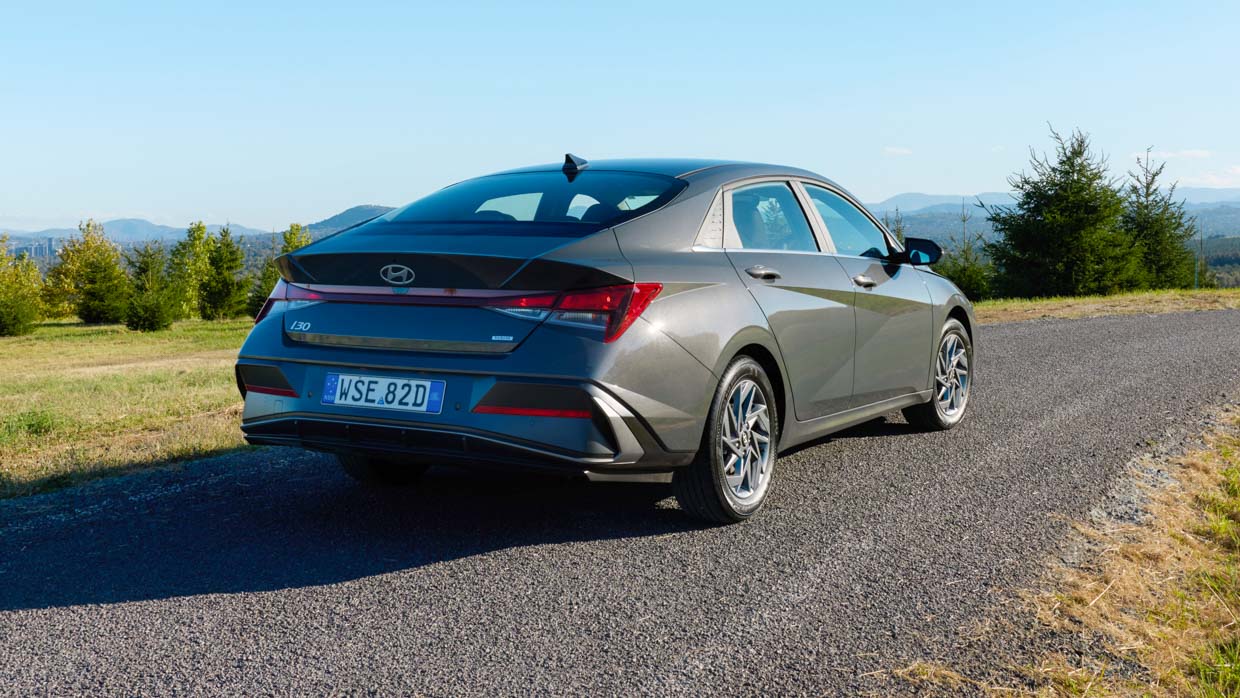
The latest arrival is the i30 Sedan hybrid. On paper, this generously-proportioned midsize sedan appears to be ultra-frugal, with a claim of 3.9L/100km combined. There’s no doubt that it is aimed directly at the Toyota Corolla hybrid in purpose and price.
Only the most basic version of the i30 Sedan hybrid has yet landed in Australia. The simply named ‘i30’ entry grade costs $33,000 before on-road costs while Toyota’s Corolla Ascent hybrid sedan stickers for $32,110 before costs.
Like its arch-rival, the i30 Sedan is clearly suited to plying a trade on Uber, Didi, and other rideshare platforms.
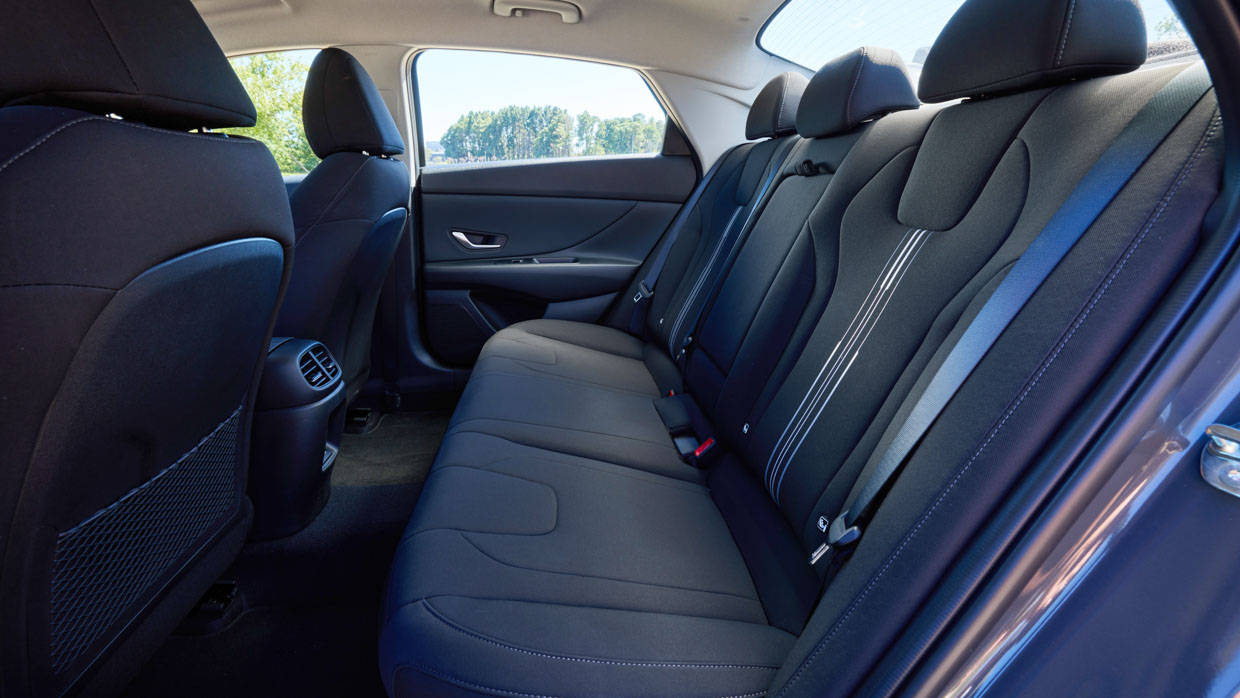
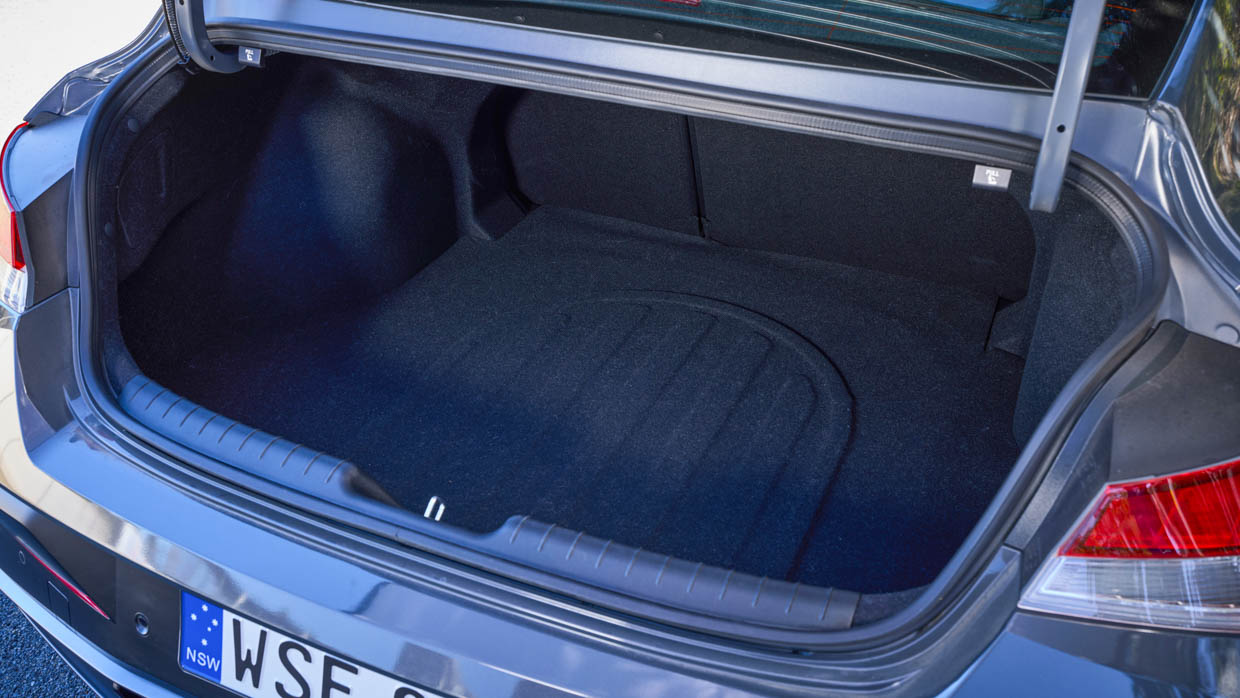
A vast (and well-appointed) back seat, complete with air vents and a flip-down armrest, a huge 474L boot (unfashionably accessed by an old-school tab next to the driver’s seat), long driving range and very low fuel costs all point to the i30’s positioning for work.
Priced at $33,000 before on-road costs, the simply-named ‘i30’ base model sedan isn’t lavishly appointed. Leather finishes the steering wheel and shifter, plus wireless Apple CarPlay, wireless Android Auto and dual-zone climate are standard – but the cabin is fairly spartan.
The base model is, oddly, a hybrid. You start in silence with a physical key rather than a push-button and the 8.0-inch touchscreen is very small. The manual cloth seats feel decent in quality but the driving position is awful, with a flat base pointing to American tastes rather than Euro ergonomics.
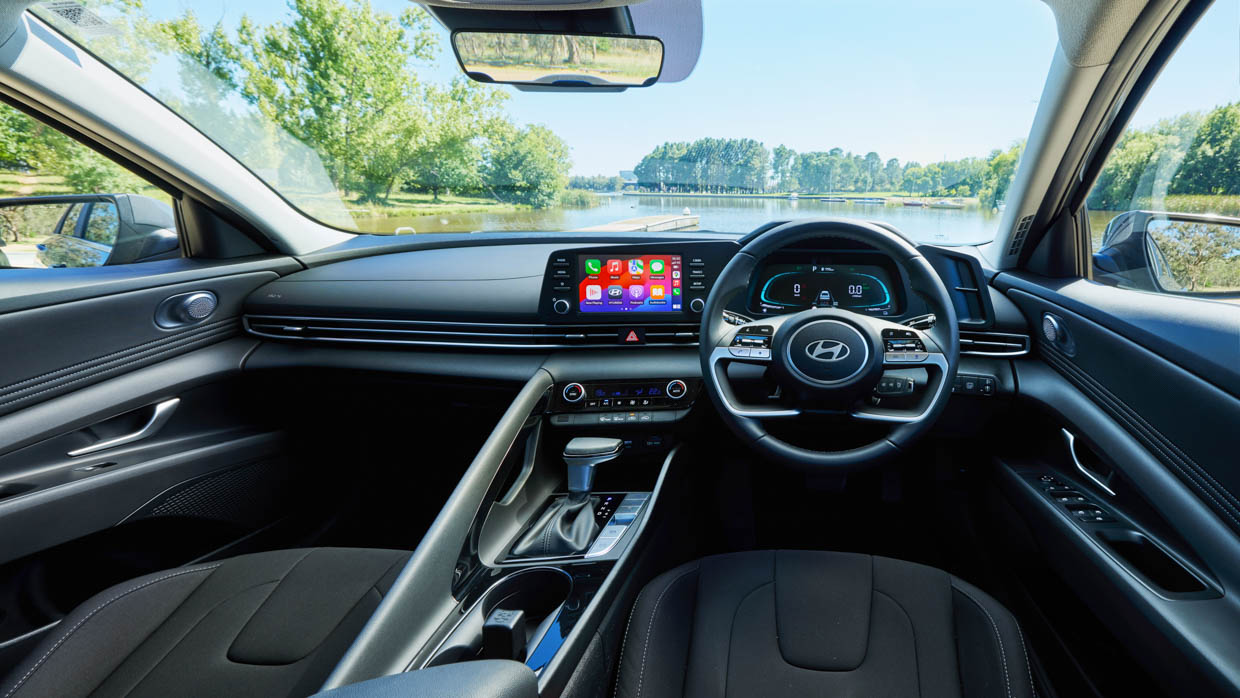
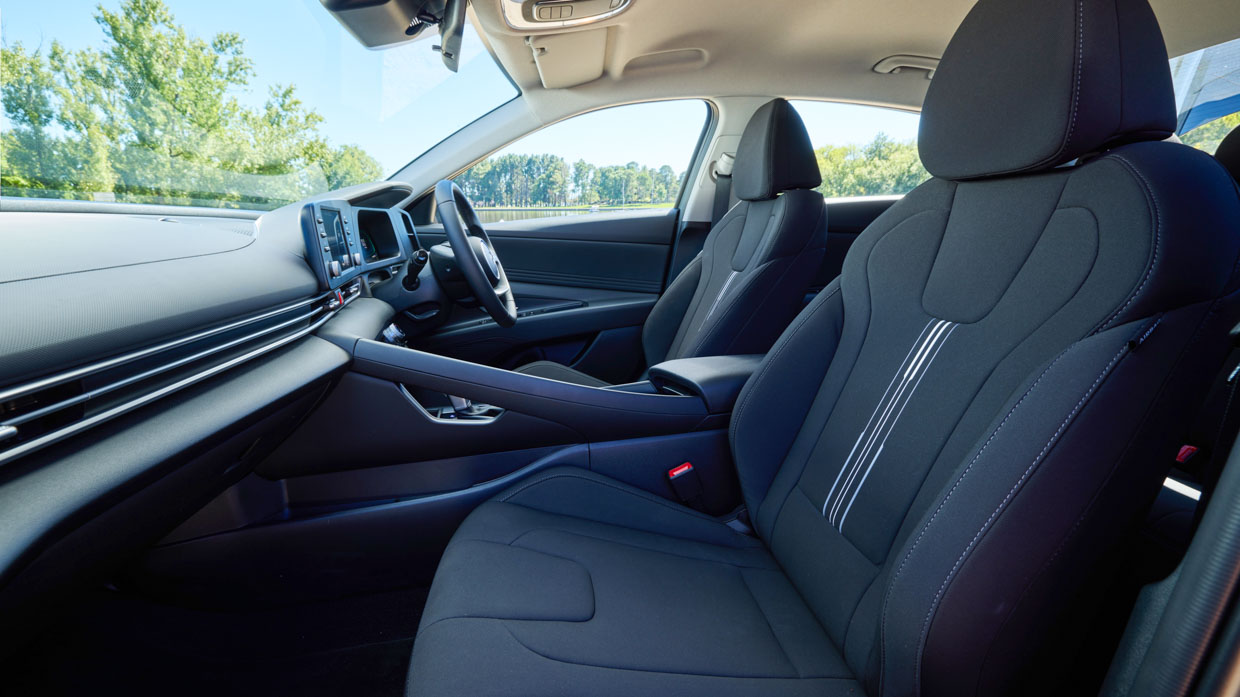
Durable (hard) plastics cover the door-tops and most of the dash, although multiple test units of this Korean-bult sedan – known as Avante or Elantra in world markets – appeared to be screwed together well with no palpable quality issues.
When the hitherto-unpriced mid-specification i30 Sedan hybrid Elite and top-shelf Premium grades arrive, they will provide private buyers with a more richly-appointed alternative to an SUV – and the Premium’s powered driver seat should make a better driving position possible.
The top grades step buyers up to charcoal leather trim, larger infotainment screens, and even heated and cooled front seats in the Premium – which makes a fuel-efficient foil to Hyundai’s sportier, larger Sonata N Line sedan ($55,500).
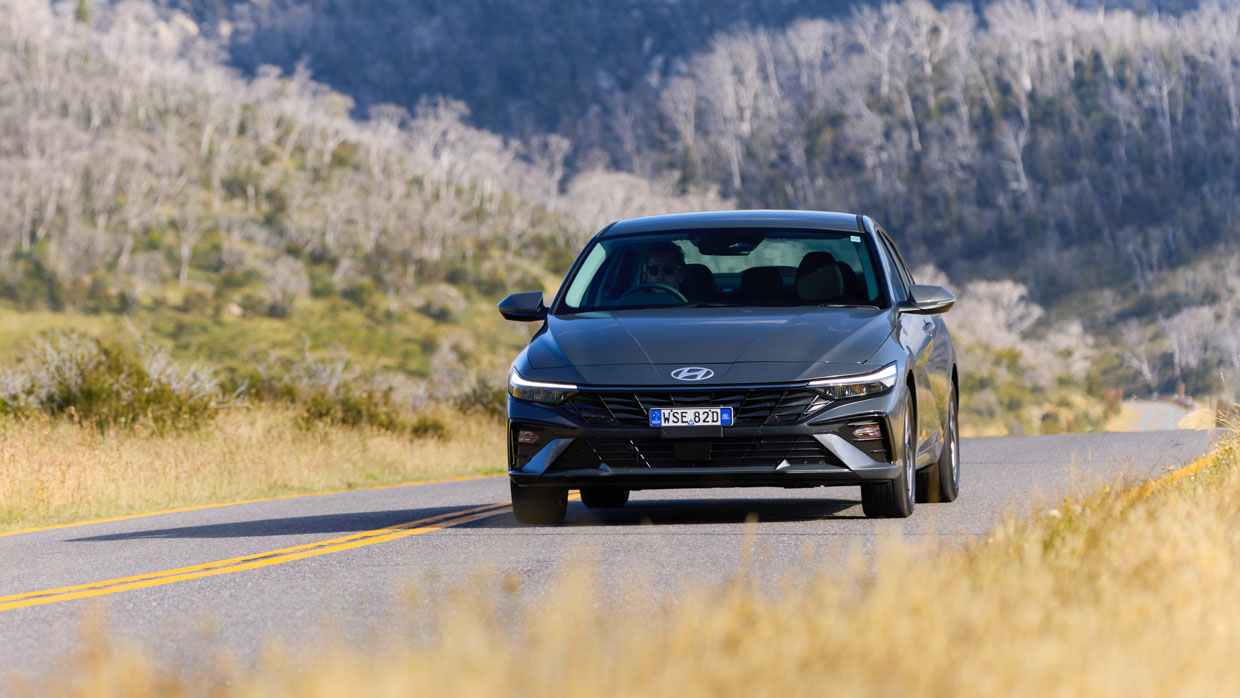
But we’d be shocked if the base model didn’t account for the lion’s share of sales. That is the only specification we drove at the national launch of the i30 Sedan hybrid which took in around 300km of driving within and outside of the town of Albury, New South Wales.
First thing’s first: fuel efficiency in the real world is very good. We haven’t tested bowser-to-bowser yet but the trip computer’s display of 3.6L/100km after a 40km suburban loop shows great promise. That would be good for a suburban fuel range of 1116km from the car’s 42-litre fuel tank.
Even a pretty spirited country road loop that included a multi-kilometre mountain pass ascent saw us unable to exceed 4.9L/100km, which is marvellously efficient for fast, involved driving on country terrain.
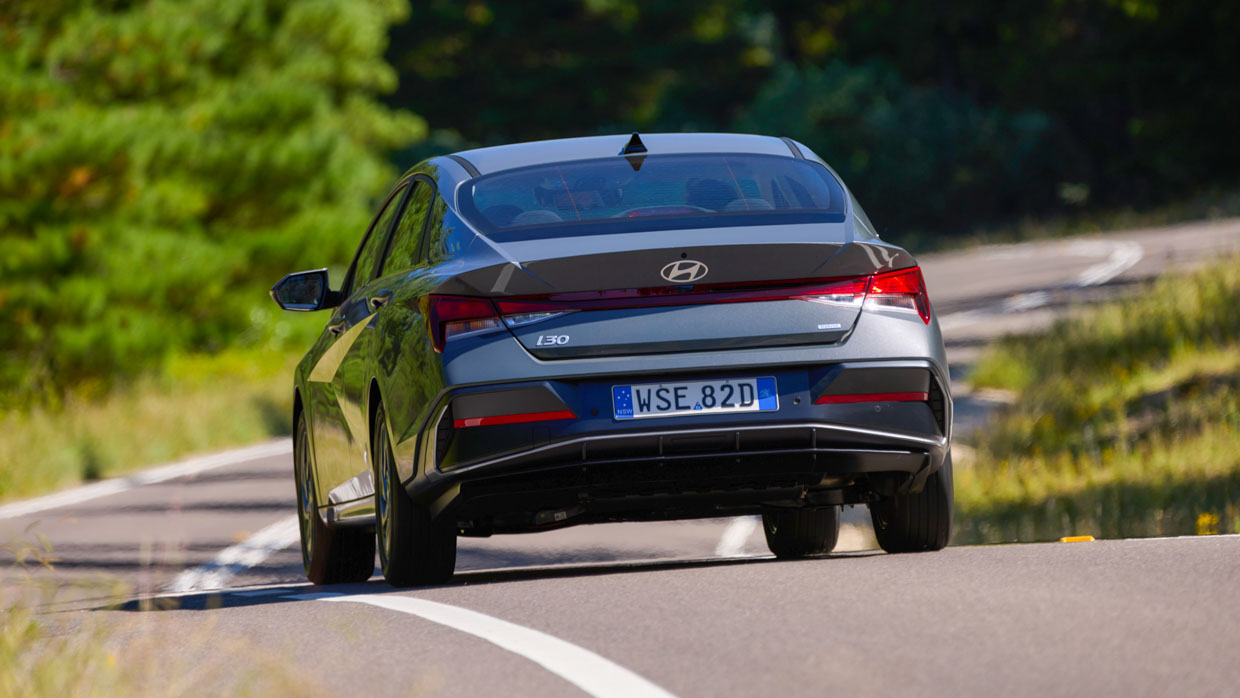
The combination of frugality, a small fuel tank and the i30’s capacity to take cheap (but dirty) 91-octane petrol means you’ll spend less than $100 to travel more than 1000km at current fuel prices.
Other running costs are reasonably priced – but not cheap. Five years/75,000km of servicing will set you back $2150, averaging $430 per year. That’s a fair bit more than the $1225 (or $245 annually) you’d spend to maintain a Corolla sedan with a hybrid engine.
It’s a similar story with the warranty. Hyundai covers the i30 sedan for five years/unlimited kilometres, while the high-voltage battery is warranted to eight years. Toyota, meanwhile, extends its hybrid warranty to ten years with annual health checkups.
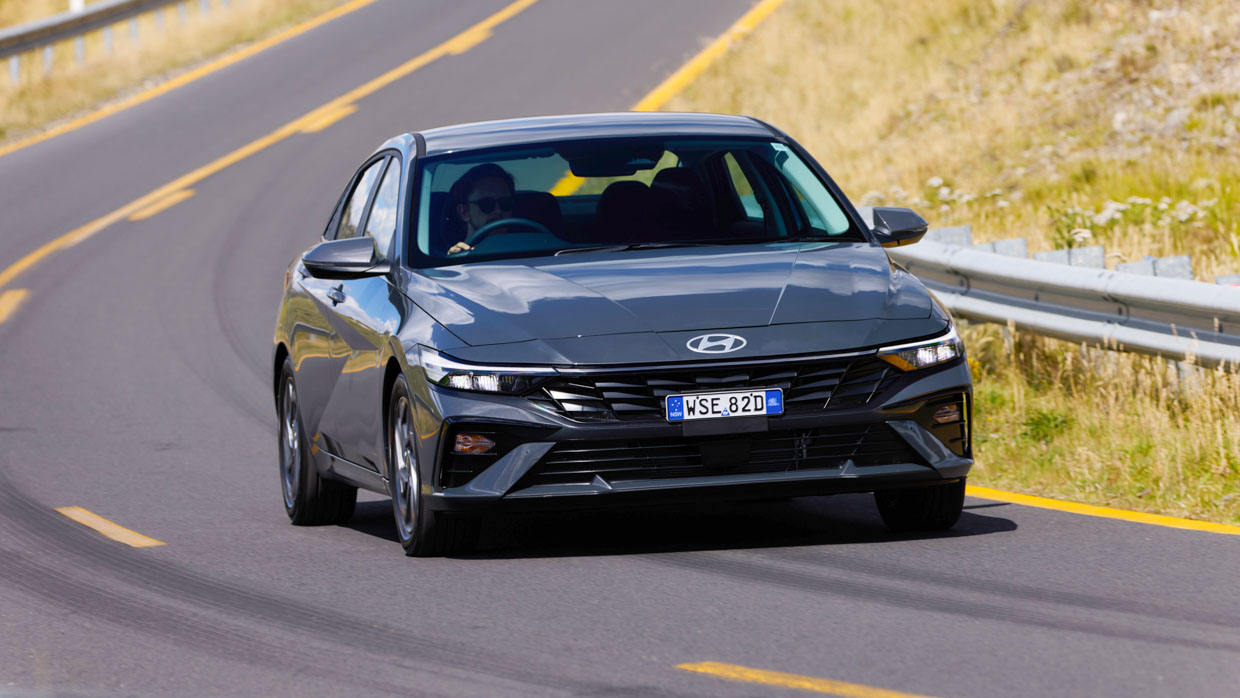
Both of the drive loops we conducted with the i30 Sedan hybrid revealed upsides and downsides to the way this 4.7-metre long sedan drives.
Town is where the cheapest i30 Sedan hybrid really shines, with its small 16-inch grey alloy wheels and chubby tyres soaking up urban imperfections with ease. Running a considerable amount of the time on hybrid electric power, it’s quiet, too.
Low speeds do not trouble the powertrain, which combines a 77kW/147Nm 1.6-litre naturally-aspirated four-cylinder direct-injected petrol engine with a 32kW/170Nm electric motor.
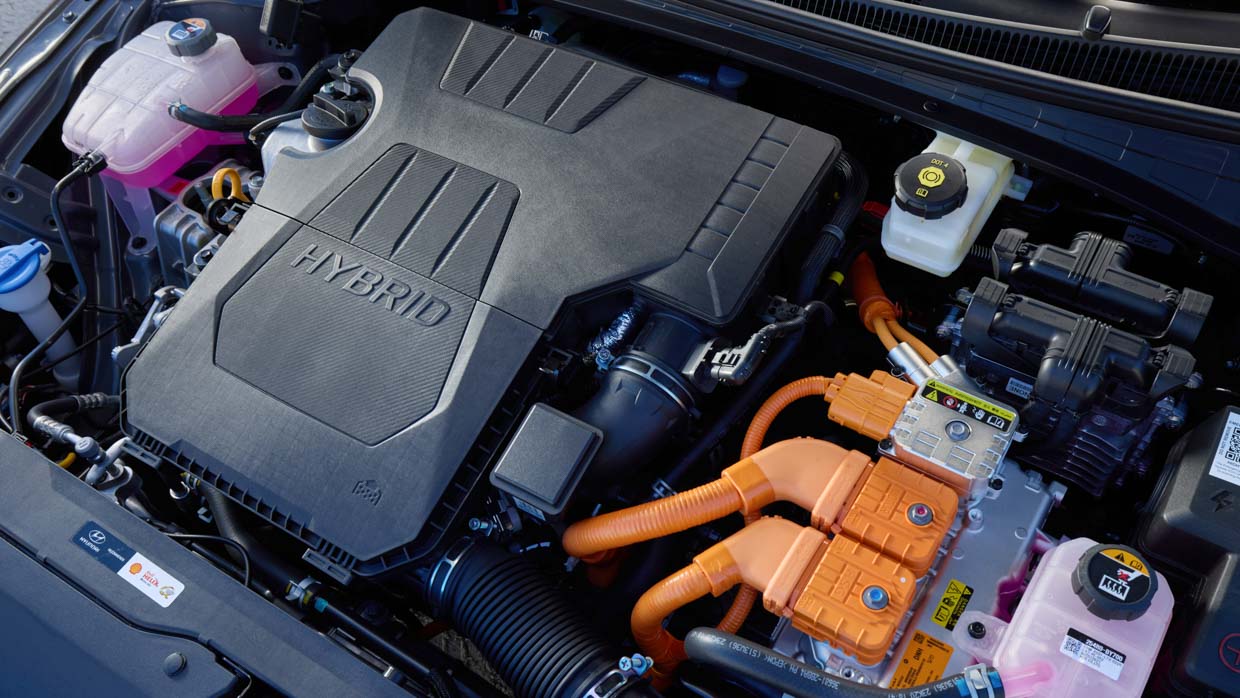
In the city or the ‘burbs, where there is plenty of opportunity for the circa-1kWh battery to regenerate juice under braking, the i30 Sedan hybrid always seems to have a pleasant burst of electric power to assist the modest 1.6-litre petrol.
It’s a different story at higher speeds, either on the highway or in the country, where the hybrid battery depletes to around 25 percent state of charge – the level where it seems to pause and offer the engine nothing more in terms of assistance.
As a result, close-run overtaking on a single carriageway needs careful planning as the combination of an exhausted hybrid battery and a torqueless top-end of the engine means there is very sluggish acceleration above 100km/h.
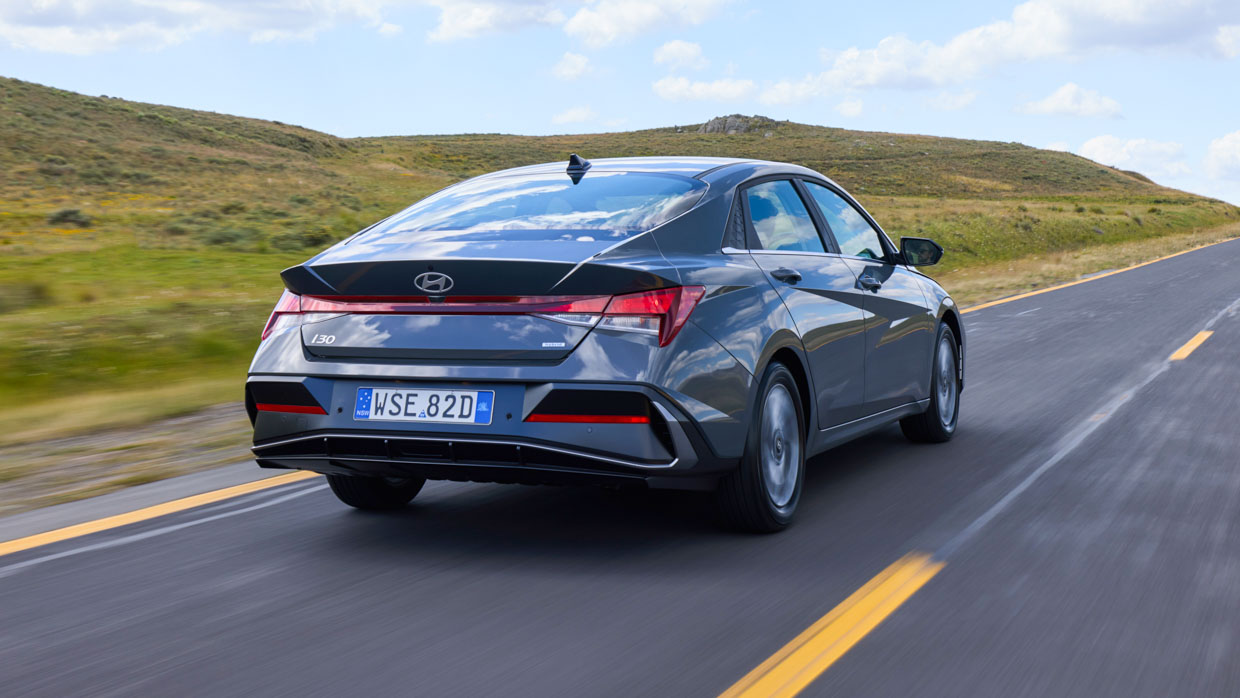
The aforementioned multi-kilometre uphill ascent saw us unable to exceed 90km/h with an apparently depleted battery leaving the loudly-revving 1.6-litre petrol to give its all – which is ultimately not a great deal.
Still, there were positive lessons, too: the i30 Sedan hybrid rides and handles remarkably well at high speeds on curving, pockmarked roads. Hyundai Australia’s talented chassis engineers validated a tune that works well on Aussie B-roads.
Unlike the cheaper, non-hybrid, 2.0-litre i30 Sedan – which uses more than double the fuel in town – the i30 Sedan hybrid has a multi-link independent rear suspension.
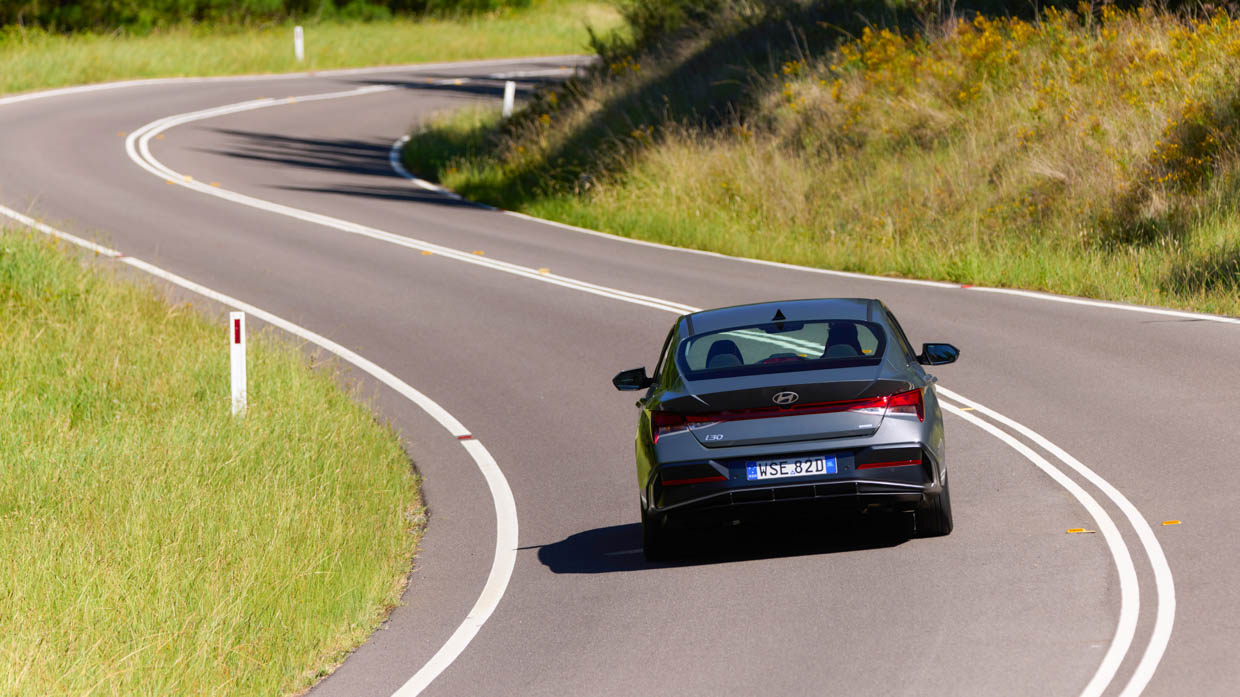
On coarse, bumpy, bending country roads, this more sophisticated rear suspension reduces boom and knock in the cabin and it also very noticeably helps point the Hyundai into corners.
In fact, a combination of accurate steering, reasonably decent grip and participation from the rear end makes the i30 Sedan hybrid a bit of a dark horse in terms of being fun to drive in the corners… just don’t ask too much of it up hills!
Refinement is just okay, with plenty of coarse-chip road noise entering the cabin at 100km/h and the mediocre stereo can’t fully compensate for this. Visibility is very decent, though Hyundai’s excellent blind spot monitoring cameras are restricted to the top-end Premium model.
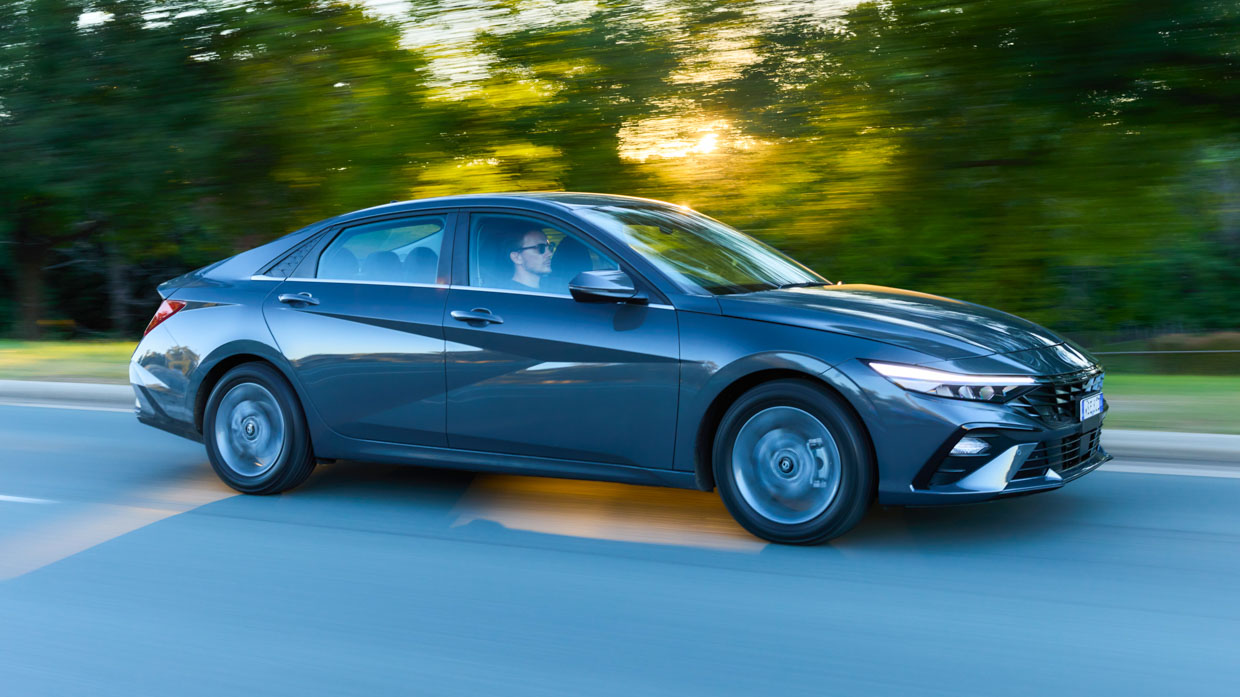
Safety systems are aplenty for all grades of the i30 Sedan hybrid and the adaptive cruise control and lane keeping assistance systems are very well-tuned on this Hyundai, reducing fatigue for highway stints noticeably.
But the Hyundai group’s speed limit warning system remains extremely annoying and often inaccurate on this car. Simply put, nannying, audible speed limit chimes are not required in Australia. Hyundai needs to either radically improve this standard-fit tech or remove it from local cars entirely.
Technology is a bit limited on the base grade. The $33K entry spec misses the five-year subscription to Hyundai’s Bluelink connected-car systems, fitted to the other grades. Bluelink calls emergency services after a crash and delivers live traffic, remote start and climate capabilities.
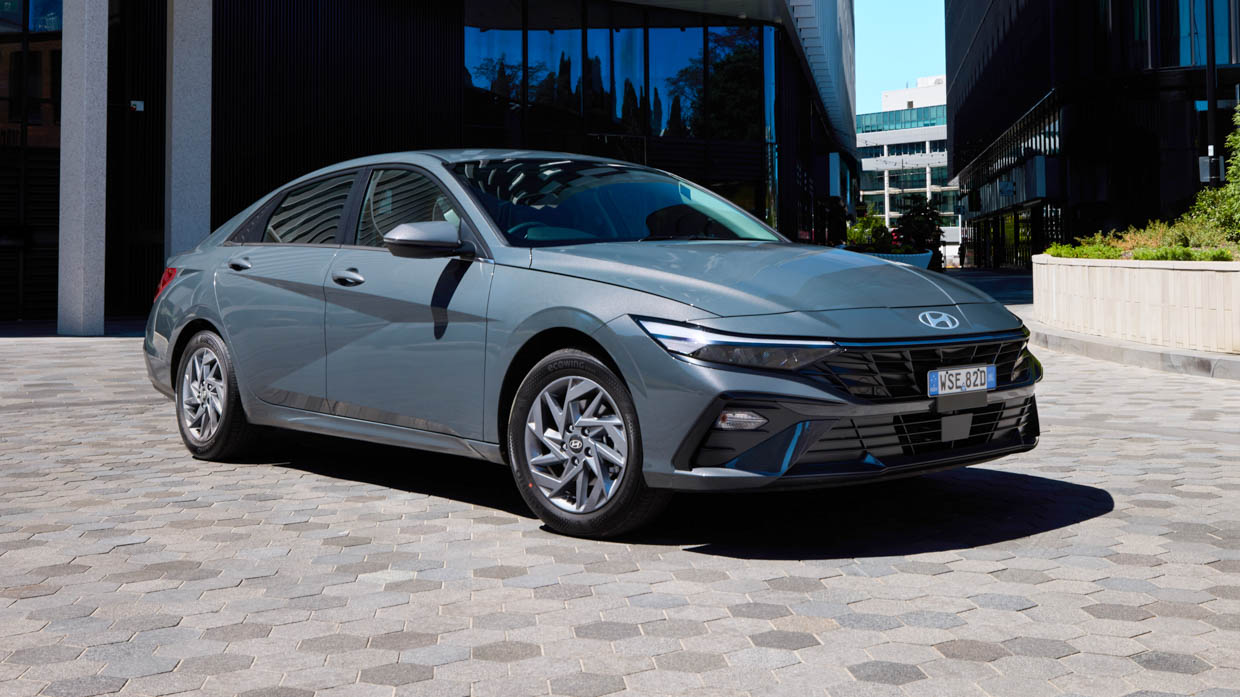
Still, the cheapest i30 Sedan hybrid is an honest, capable alternative to the well-known Toyota Corolla hybrid. With supply for the latter remaining tight, the Hyundai will be a welcome pressure release for customers who need maximum space and efficiency while keeping purchase and running costs low.
For private buyers, the best i30 Sedan hybrid almost certainly has not arrived in Australia yet. The Elite and Premium grades will up the comfort and refinement – if not the performance. If we were buying for ourselves, we’d wait to see the price those cars will land at.
Key specs (as tested)
About Chasing cars
Chasing Cars reviews are 100% independent.
Because we are powered by Budget Direct Insurance, we don’t receive advertising or sales revenue from car manufacturers.
We’re truly independent – giving you Australia’s best car reviews.
The estimate provided does not take into account your personal circumstances but is intended to give a general indication of the cost of insurance, in order to obtain a complete quote, please visit www.budgetdirect.com.au. Estimate includes 15%^ online discount.
^Conditions Apply
Budget Direct Insurance arranged by Auto & General Services Pty Ltd ACN 003 617 909(AGS) AFSL 241 411, for and on behalf of the insurer, Auto & General Insurance Company Limited(ABN 42 111 586 353, AFSL 285 571).Because we don’t know your financial needs, we can’t advise you if this insurance will suit you. You should consider your needs and the Product Disclosure Statement before making a decision to buy insurance. Terms and conditions apply.
Indicative quote based on assumptions including postcode , 40 year old male with no offences, licence suspensions or claims in the last 5 years, a NCD Rating 1 and no younger drivers listed. White car, driven up to 10,000kms a year, unfinanced, with no modifications, factory options and/or non-standard accessories, private use only and garaged at night.
^Online Discounts Terms & Conditions
1. Discounts apply to the premium paid for a new Budget Direct Gold Comprehensive Car Insurance, Third Party Property Only or Third Party Property, Fire & Theft Insurance policy initiated online on or after 29 March 2017. Discounts do not apply to optional Roadside Assistance.
2. Discounts do not apply to any renewal offer of insurance.
3. Discounts only apply to the insurance portion of the premium. Discounts are applied before government charges, taxes, levies and fees, including instalment processing fees (as applicable). The full extent of discounts may therefore be impacted.
4. We reserve the right to change the offer without notice.